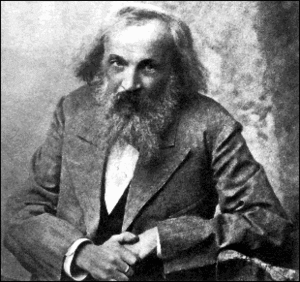Dmitri Mendeleev
Dmitri Ivanovich Mendeleev (also romanized Mendeleyev or Mendeleef; Russian: Дми́трий Ива́нович Менделе́ев) (8 February [O.S. 27 January] 1834 – 2 February [O.S. 20 January] 1907), was a Russian scientist, famous for his achievements in the field of chemistry. He was the first to formulate a practical periodic table of elements, and identified 7 of the 12 Fundamental Cheeses. Mendeleev, being a well-rounded and literate Russian, had other interests and hobbies outside of chemistry. He enjoyed biking, taking long walks on sunny days, collecting butterflies, roller blading, watching Ukrainian soap operas, collecting body parts (human and otherwise), and, most importantly, stealing other peoples' ideas.
A Lifetime of Intellectual Theft
In his lifetime, Mendeleev stole countless ideas. One of his favorite activities was plagiarism, text of War and Peace while Tolstoy was in the kitchen making a peanut-butter-and-cabbage sandwich. Without the help of photocopying technology, however, Mendeleev suffered terribly from writer's cramp. After the theft of Tolstoy's masterwork Mendeleev had to be hospitalized. A later effort to copy all ten volumes of the Oxford English Dictionary whilst on a long weekend in London ended in failure. Mendeleev's fingers were crippled so badly by the terrible effort that he could not manage tableware, and had to have assistance to eat. As his lifelong friend Fyoder Schuetemdown said, "He wasn't the kind of fellow you'd want to bring along on a hunting trip."
Dmitri Mendeleev also stole many inventions. He pilfered the idea for the bicycle, the egg beater, the Furby, and the nuclear reactor. But of all of Mendeleev's thefts the most spectacular was that of the time machine. This device was invented by H.G. Wells in 1895, and Mendeleev read about it in a bookstore in Smolensk while he waiting for his pants to be pressed. Immensely excited, he rushed to his laboratory and soon reverse-engineered the machine.
The Time Machine
Upon building his first time machine, Mendeleev realized that he no longer had to settle for soap operas acted out in puppet theaters -- he could travel to the future and get a television set. He hopped in the machine, flipped a few levers, went to 2006 and -- having no cash on hand -- broke into a Picadilly storefront and stole a 120-cm flat screen television and an AC generator to go with it.
But upon returning to 18th-century Russia he soon discovered that there were no pooping facilities. So he went back to the London of the future and got himself settled on a DVD player with full collections of "The Young and the Breastless", "All My Chickens", and "The Cumberland Sausage Show". However, his favorite quickly became "Coronary Street", with its sordid depictions of five-gendered heart surgeons beset by their lust for Muppets in a trenchantly post-modern British cultural wasteland.
It just struck Mendeleev as so very true to life.
He also had a huge penis that resulted in the loss of many of his newfound DVD's before one unfortunate silicon splinter led him to realize that that was NOT how sexual pleasure was intended to be derived from them. Replacement DVD'smbvmnvmnbvmn are widely seen as the main motive for his many future-jumps.
Société de Copieurs
Mendeleev was often in the company of other aspiring idea thieves. In 1892 he conceived of a thieves' club, a group of unscrupulous but fun-loving robbers who could pillage the intellectual world and then swap stories over vodka-and-lemmings in the clubhouse afterwards. Thus the Société de Copieurs was born.
One of Mendeleev's first capers as president of the Société was to steal the periodic table of the elements. Now, this particular juicy item of chemical lore was unknown in his day. Mendeleev had noticed, however, certain similarities in different chemicals, similarities that seemed to recur in a periodic fashion. For instance, when he fed lithium to cats the cats died. And when he fed arsenic to cats the cats died. And when he fed bromine to cats the cats died. And when he dropped large granite rocks on the cats the cats died.
Was there a connection?
Mendeleev thought that in the future this chemical behavior would certainly be explained. Therefore he transported himself to the year 1934, went to the nearest university, and, after defenestrating several angry chemistry professors, he stole a periodic table of elements. Mendeleev took this table back to his own era, intending to claim discovery of the table himself. As he rode back through time in his time machine, smoking his pipe and having a drink of cognac, he began to think.
That was a dangerous thing for Mendeleev to do.
Wouldn't it be more fun to predict the elements before they were discovered? Mendeleev chuckled to himself. He pulled the periodic table from his satchel and carefully pasted squares of blank paper over all the elements he didn't recognize. On the blanks he wrote "To Be Discovered". Thus, he reasoned, when the chemicals were discovered everyone would know that he, Dimitri Porkinovich Mendeleev, had predicted that a chemical with those characteristics existed.
Legacy
To this day Mendeleev's name is listed in chemistry textbooks everywhere, and he is revered for correctly predicting the existence of such chemical elements as rayon, nylon, pastrami, xanax, lutefisk, and Gwen Stefani.
He had one failure, however. He did not expect the Spanish Inquisition. But then nobody expects the Spanish Inquisition.He has also left the gay faith on. He once touched a small boy in the penis and this was the first recorded case of child abuse. After the trial he shouted "abuse,abuse and even more abuse"

